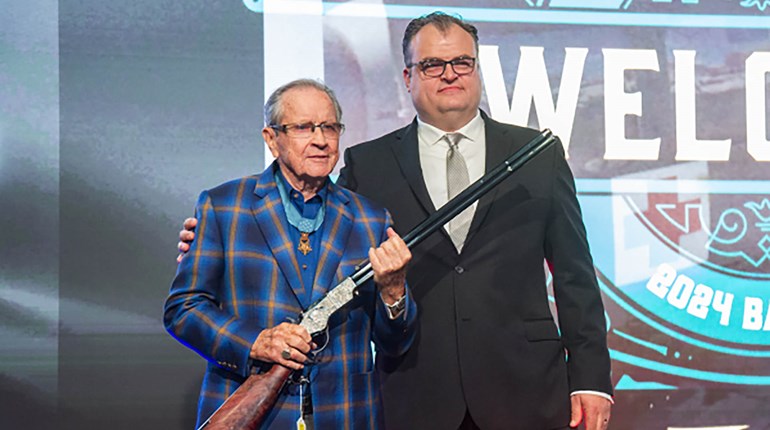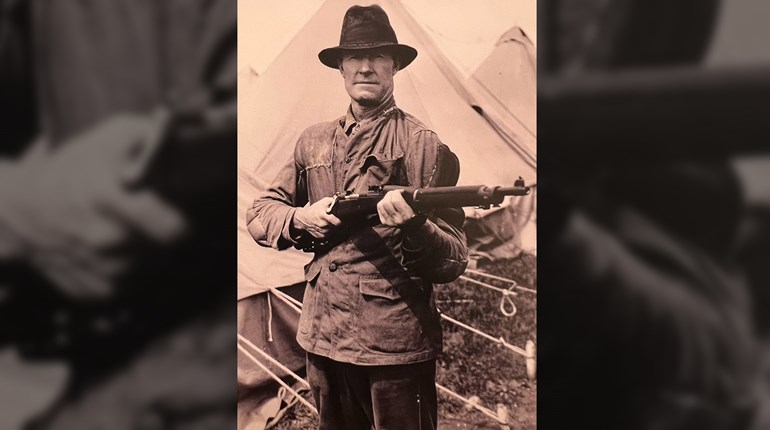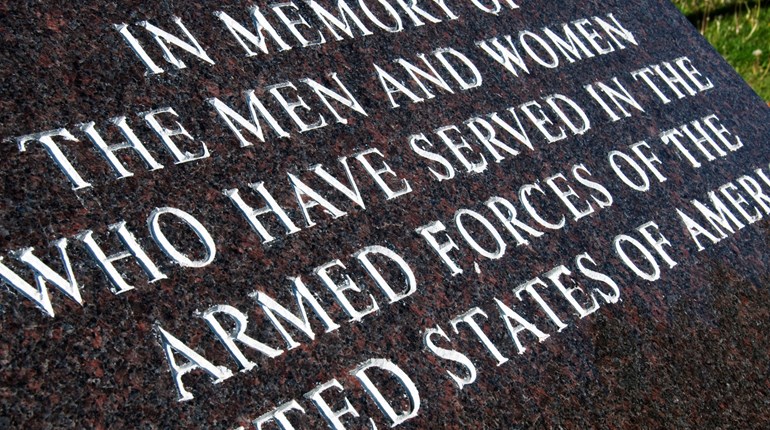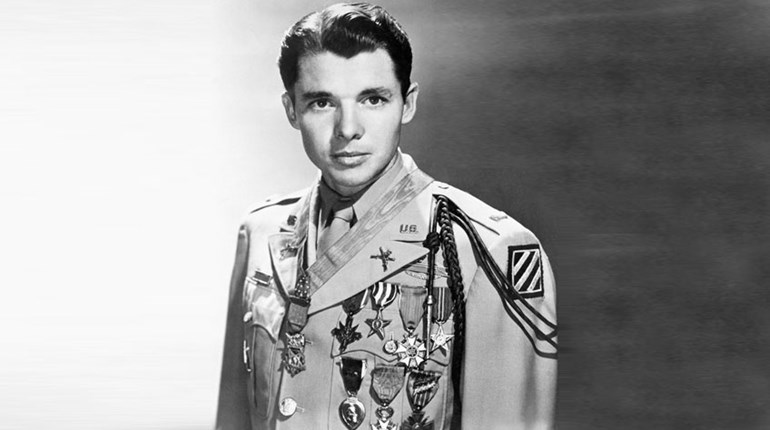
Another Memorial Day has come and gone with a speed that alarms us slightly. It seems just a few weeks since we collected some thoughts and recollections about those who sacrificed something—or everything—in the service of our nation.

We’re not embarrassed to concede we are more than a little overcome whenever we delve here: The roughly 50 million men and women who’ve worn our country’s uniform have made astonishing sacrifices. The tiny sliver we’ve been fortunate enough (here, here and here, for instance) to know personally always make us feel our good fortune at being Americans in the keenest ways.
That good fortune and their great sacrifice have so many parameters that measurement and comparison is no simple matter: Eras have their own standards and travails that do not always translate to other times and world views. But “anchors” are out there, and the more turbulent the times, the more precious they become. This Memorial Day week, we consider one such: In the week that surrounds the observance, 67 of the nation’s highest decorations for battlefield valor have been awarded, we bring you some Memorial Day Medals of Honor.
The week itself is an average one: Of the 3,514 total awards to 3,495 recipients, an average number were made between May 27 and June 2, and in all of America’s conflicts from the Civil War—the inception of the medal. Beyond that, the division is unsurprising: The Army, as the nation’s largest service and especially in the first century of the Republic, saw 42 medals awarded; the Navy 19; and the Marine Corps a heroically disproportionate six.In the week that surrounds the observance, 67 of the nation’s highest decorations for battlefield valor have been awarded, so we bring you some Memorial Day Medals of Honor.
By grade, the distribution is wide as well. Two General officers (both Army Brigadiers in the Civil War; Oliver Howard, at the cost of his right arm, and Rufus Saxton) received the medal, but 14 privates did, too. Major and surgeon Gabriel Grant also received a Civil War medal, one of only 18 MDs ever to do so. Dr. Grant was a relatively common survivor for his era, when nearly four out of five recipients survived to accept their medals.
A very rare double recipient (only 19 have been so honored) also falls within our week—Navy Chief John King. In an interesting twist, King—a native of Ireland—received neither of his medals for “combat” actions per se, but rather for heroics in the face of terrible accidents. His first award occurred in May 1901 in the wake of a boiler room explosion “… for extraordinary heroism in the line of his profession …” while aboard the USS Vicksburg, and the second in the wake of a similar propulsion accident aboard USS Salem in 1909. A Charles F. Adams-class destroyer (DDG-3) was also named for King in 1960.
Firemen First Class Peter Johnson and George Mahoney would earn their medals in similar fashion aboard the USS Vixen. In Cuban waters during the Spanish-American War, their ship also experienced a boiler explosion. They entered the fire room to rescue injured fellow crewman at huge hazard.
Mere days later, eight volunteer crewman aboard the collier USS Merrimac would attempt to blockade the Spanish fleet in Santiago de Cuba harbor. Attacked from both land and sea (two cruisers and a destroyer, plus land-based artillery), she failed to block the mouth of the harbor. Interred by the Spanish, the intrepid eight—Lt. Richmond Hobson, Coxswains Claus Clausen, Osborn Deignan and John Murphy; Chief Master-at-Arms Daniel Montague, Gunner’s Mate FC George Charette, Machinist FC George Phillips and Watertender Francis Kelly would all be awarded the Medal of Honor. The Spanish Caribbean flotilla would attempt to flee only a month later, losing the Battle of Santiago de Cuba and shortly thereafter the Spanish-American War. A very rare double recipient (only 19) also falls within our week: Navy Chief John King.
The Merrimac incident rang strangely familiar in Navy annals: 35 years before, six crewman from the USS Cincinnati had escaped a similarly well intentioned but unsuccessful mission at Vicksburg. (Quartermasters Frank Bois and Thomas Hamilton, Boatswain’s Mate Henry Dow, Landsman Thomas Corcoran and Seamen Thomas Jenkins and Martin McHugh would save shipmate after shipmate from the grounded casement gunboat, and all received the Medal of Honor.)
U.S. Army Sgt. James Strong and Cpl. Francis Warren won their Civil War medals in the same action: Union Major Gen. Nathaniel Banks’ assault on Port Hudson, La. Strong enlisted in the 49th Massachusetts Infantry at 44, yet despite his age led an action pivotal to the eventual capture of Port Hudson. Warren advanced on Confederate fortifications under heavy fire in advance of a broader assault, yet survived. He would rise to the rank of Captain, and eventually serve in many political positions in Wyoming, becoming the state’s first governor in 1890.
It’s difficult to know if later generations of soldiers, sailors and—eventually—airman actually faced more dangerous battlefield conditions, or if other factors account for a much higher percentage of posthumous awards in later conflicts. By World War II, 58 percent of awards were made in this fashion, and 73.8 and 62.9 percent, respectively, in Korea and Vietnam.
Certainly U.S. Army winners paid a terrible price in Central and Northern Italy this week in 1944. Private Shinyei Nakamine destroyed or captured three machinegun positions before an assault on a fourth claimed his life near La Torreto. Private Furman Smith held 80 counter-attacking Germans at bay while protecting wounded comrades before he was killed south of Rome. North of Verona, Cpt. William Galt commandeered a stalled tank destroyer and used it to overcome an enemy anti-tank position. Under a hail of sniper and machinegun fire, he used grenades and a .30 Browning to corner 40 German soldiers and ordered them to surrender; Galt engaged and defeated them all when they refused, only to be felled when a fabled German “88” (88 mm-high velocity artillery) caught up with his track a few minutes later. By World War II, 58 percent of awards were made posthumously, and 73.8 and 62.9 percent, respectively, in Korea and Vietnam.
In 1951, Private First Class Whitt Moreland kicked several grenades over a ridgeline to protect himself and his comrades before one landed just too far away for him to dispatch it too. Instead, he warned his comrades and leapt to cover the explosive, which killed him. Ohioan and United States Marine PFC John Kelly turned his radio over to a fellow Marine and joined an assault on multiple machinegun positions manned by superior forces in early June of 1952. Personally neutralizing the first position, he continued on to a second bunker despite his wounds, and destroyed it too. Only at the third did his wounds become mortal.
As perhaps you see, a complete Memorial “week” tally would be a book-length work in itself, and yet remain regrettably incomplete: Many more died this week, or any week, in their unwelcome turn. Not numbered are many others—and of other conflicts—who endured equally harrowing yet unrecounted service.
But as a vehicle for memory, these courageous few give Memorial Day its meaning and measure—that of a nation and of her soldiers. In the end, it will never have been about decorations or honors of any sort, but in serving, perhaps to the very last, something larger than self.
Another Medal of Honor winner—though not from the week we discuss here—wrote it well: “Far better is it to dare mighty things, to win glorious triumphs, even though checked by failure ... than to rank with those poor spirits who neither enjoy much nor suffer much, because they live in a gray twilight that knows not victory nor defeat.” (Theodore Roosevelt, Medal of Honor, Spanish-American War, and 26th President of the United States.)


































